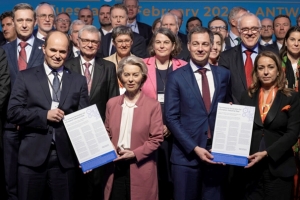The European Industrial Agreement is a challenge and an opportunity for ports and economic zones

 By Marek Grzybowski
By Marek Grzybowski
Leaders of more than a dozen industrial sectors are calling for 10 urgent actions to restore competitiveness and preserve jobs in Europe. 73 industry leaders representing almost 20 industrial sectors presented the “Antwerp Declaration on a European Industrial Agreement” to Belgian Prime Minister Alexander De Croo and Commission President Ursula von der Leyen In February 2024.
The declaration emphasized the involvement of European industry in the development of Europe, its role in the transformation of the Continent, and indicated a package of urgent actions to meet favorable conditions for the development of European industry. The idea is “to make Europe competitive, resilient and sustainable in the face of dire economic conditions,” stressed the communiqué following the signing of the declaration.
At the European Industrial Summit, held at BASF in Antwerp, leaders from leading European industries, representing 7.8 million workers in Europe, joined forces with European trade unions and European leaders. Competition and cooperation between Asian countries is pushing European industries into a corner, with many companies becoming assembly terminals of the network of Asian suppliers.
Assembly plants are a burning threat
In many cases, European companies assemble elements produced in Asian countries. Many service centers are also moving there. In the case of the shipbuilding industry, it is still possible to export to shipyards in China and South Korea. many complex devices, which we then buy back wrapped in ship hulls manufactured in Asian shipyards.
Even the strongest companies and trade unions have said that the pressing threats to Europe’s industrial landscape must be addressed. The “Antwerp Declaration”, supported by managers from many industrial sectors, emphasizes the key importance of transparency, predictability and trust in European industrial policy,” it is noted on the website of the declaration’s signatories.
– Europe’s core industries are facing historic challenges: demand is falling, investment on the continent has stalled, production has fallen significantly and production facilities are at risk. We want to drive the transformation of our companies, said Martin Brudermüller, CEO of Cefic.
The meeting stressed in an alarmist tone that Europe needs “decisive action to create the conditions for a stronger business case. The ‘Antwerp Declaration’ points the way forward.” European industrialists saw salvation in the Green Deal.
– By putting the European Industrial Agreement at the top of the strategic agenda, the EU would pave the way for a resilient, competitive and sustainable Europe. This is the only way to show the rest of the world that the Green Deal works for everyone, notes Brudermüller.
Carbon puzzle
The declaration of European industrialists is signed at a time when the most dynamically developing economies are also the largest consumers of coal and emitters of CO2. European Union industrialists are calling for the Green Deal when the world consumes 8.5 billion tons annually, of which the PRC consumes over 4 billion tons – reported the portal “THE COAL HUB”. The global increase in coal consumption in the world’s economies amounted to 1.4% in 2023.
In 2023, consumption in most developed economies fell sharply. Record declines were observed in the European Union and the United States. It was about 20% in each case – EIA experts estimated. Demand in emerging and developing economies remains very strong, growing by 8% in India and 5% in China in 2023. Growing demand is driving high demand for electricity and weaker hydropower production.
EIA assumes that in 2026, China and India will be responsible for over 70% of global coal consumption for production and consumption purposes. Meanwhile, the European Union and the United States will account for approximately 3% of global coal consumption. “This growing disparity in countries’ dependence on coal could pose a challenge to future international dialogue on the need to rapidly reduce global coal consumption to meet climate goals,” US analysts predict.
The Green Deal is a rescue for the industry
Protests by agricultural producers in all agricultural countries of the European Union, including Poland, prove that not all industries accept the desire to quickly implement declarations related to the Green Deal. Is it possible to reconcile the demands of industrialists with the expectations of farmers?
The declaration presents 10 actions to support European Union industries. There are calls for including the EU industrial agreement in a broad European strategic program, streamlining legislation and simplifying the state aid framework. The answer is given in what directions states should help industrialists.
It is about transforming Europe into a world leader in providing significant amounts of affordable, low-carbon energy. Strategic partnerships and extensive infrastructure will help achieve this goal. It is emphasized that “stronger support for EU projects” is necessary.
The strategic direction is to ensure self-sufficiency in raw materials. It is emphasized that it is necessary to support the demand for sustainable products and accelerate innovation. It is also emphasized that the European single market is an asset that should be used and revitalized. The demands of industrialists must be supported by legislation that will encourage investment. Good law is intended to provide conditions that will enable the effective implementation of economic policy.
There will be a revival of Europe’s industrial landscape
The signatories of the Declaration are representatives of various sectors, ranging from chemical, pharmaceutical, paper and steel. It was also signed by managers and trade unionists from the following industries: mining, aluminum, glass, zinc, metal, textile, refining, cement, lime, fertilizers, ceramics, industrial gases and biotechnology. There were no representatives of the shipbuilding industry, which is struggling to survive in the shadow of Asian competition supported by European shipowners.
It is emphasized that the “Antwerp Declaration” is an urgent call to revitalize Europe’s industrial landscape, strengthen core industrial sectors, ensure their competitiveness, sustainable development and resilience in the face of changing geopolitics.
Representatives of many industrial concerns declare actions aimed at contributing to a stronger Europe. “Only thanks to a strong industrial structure and strengthened social dialogue in Europe can we ensure that the green transition is a just transition,” says the signatories in the communiqué.
Farmers’ information shows that the Green Deal also has hidden traps that could make Europe dependent on food imports. It turned out that subsidies for agricultural production do not ensure food security in Europe. Subsidies are largely provided to producers of fertilizers and other inputs necessary for food production. EU regulations support completely different industries than intended through farmers. Globalization and the takeover of the market by transnational monopolies have caused the food market to get out of control.
It said that “the declaration marks a joint effort to address the challenges and lays the foundations for reviving industrial investment in Europe, marking the beginning of the implementation of the European Green Deal.”
Europe is expensive and uncompetitive
Farmers’ protests make us realize that the European economy is not competitive. And not only in agriculture, but also in the food industry. It turns out that not only in these areas. First, the pandemic and more recently the attacks on ships in the Red Sea have shown that the European economy in many industries is not immune to the breaking of logistic chains. This happens in traditional and the most innovative industries. Such as the production of gas carriers, or equipment for offshore, electric cars, or industrial electronics and retailers.
The “Antwerp Declaration” is nothing more than a demand for the transfer of production to Europe. Deglobalization will require rebuilding the entire network of global logistic connections and intensive development of economic zones. Economic zones and logistics centers located near sea ports will have the greatest opportunities.
A good example is the Pomeranian Special Economic Zone,
where 76 support decisions were issued in 2023, and the declared investment outlay of projects exceeded PLN 1.8 billion. An example of the use of the former Gdańsk Shipyard area is the construction of Baltic Towers. This is an investment worth PLN 858 million.
Maintaining shipbuilding and industrial production, including yacht production, on the premises of former shipyards in Gdańsk and Gdynia is a good example for developing production and services around seaports. The production plants for offshore wind farm components being built in Szczecin are perhaps the first attempts to concentrate production in Poland close to port cities.
But it must be remembered that industrial regions around the ports of Rotterdam and Antwerp, the ports on the Seine, and around the ports of the Mediterranean Sea are also becoming more active. British ports receive support in the development of green technologies and industrial zones.
In industry, there is probably no turning back from the Green Deal. Small agriculture will still defend itself until it is eaten by corporations. Managers of industrial concerns will use “green strategies” to build competitive advantage. Deglobalization and shortening of supply chains is gaining momentum. And if the Polish Investment Zone, together with large and small ports, fits into these strategies, it will contribute to the implementation of the policy set by industry leaders during the February meeting in Antwerp.
